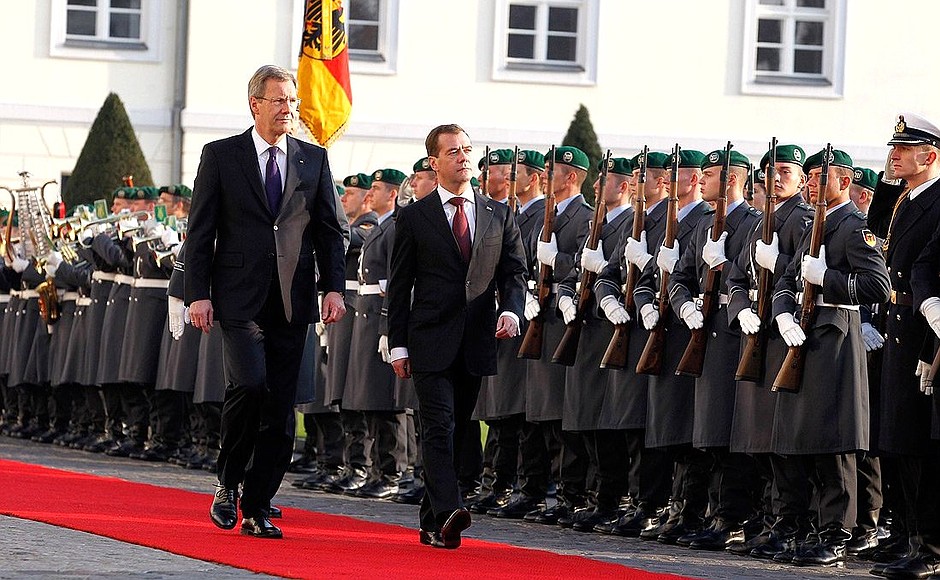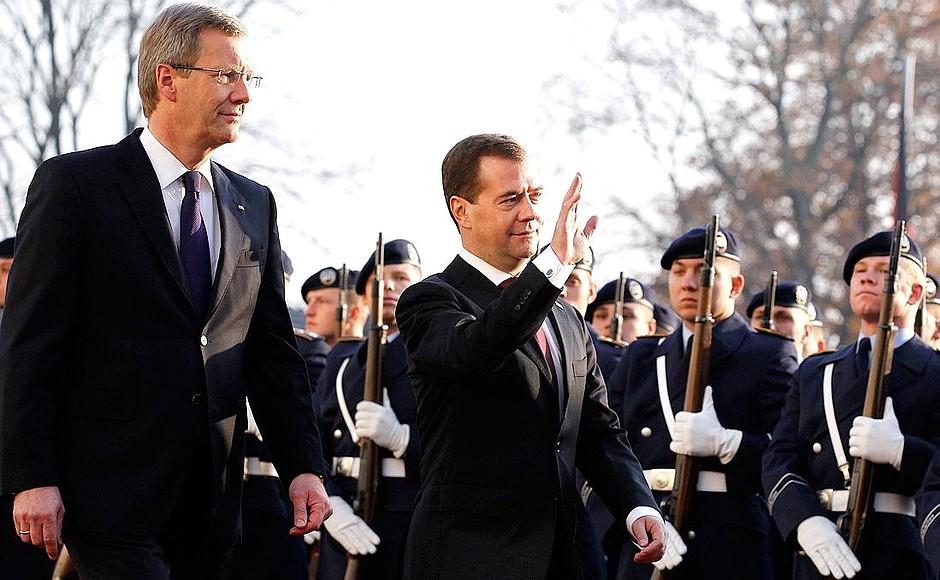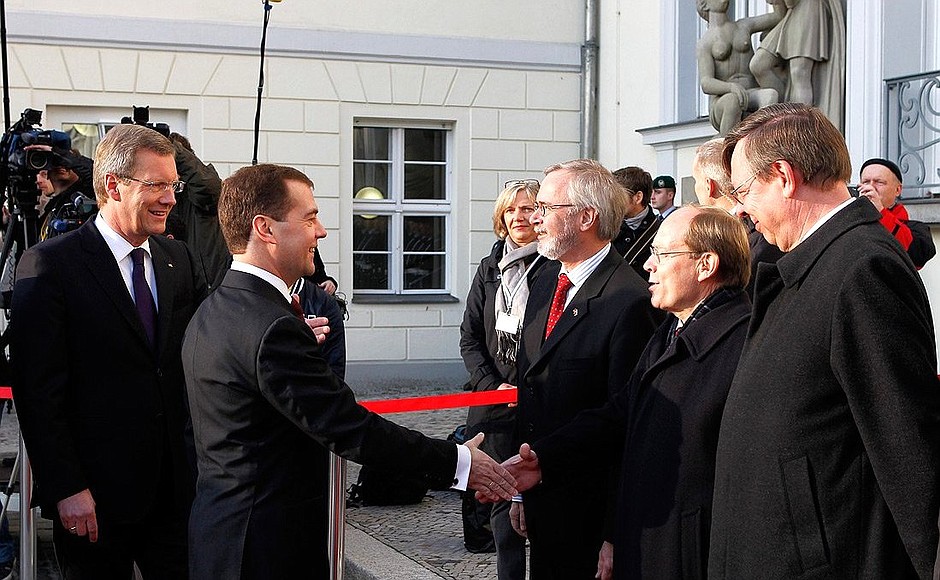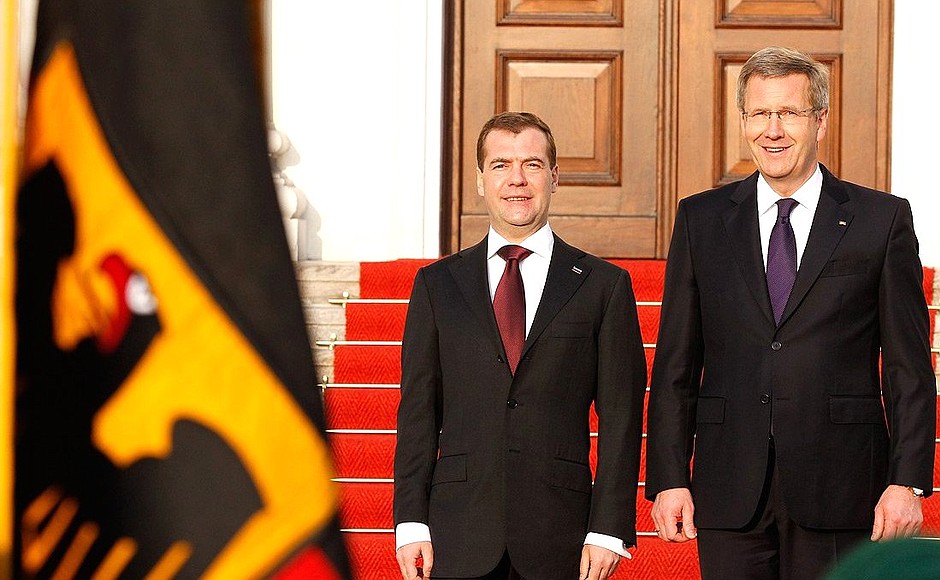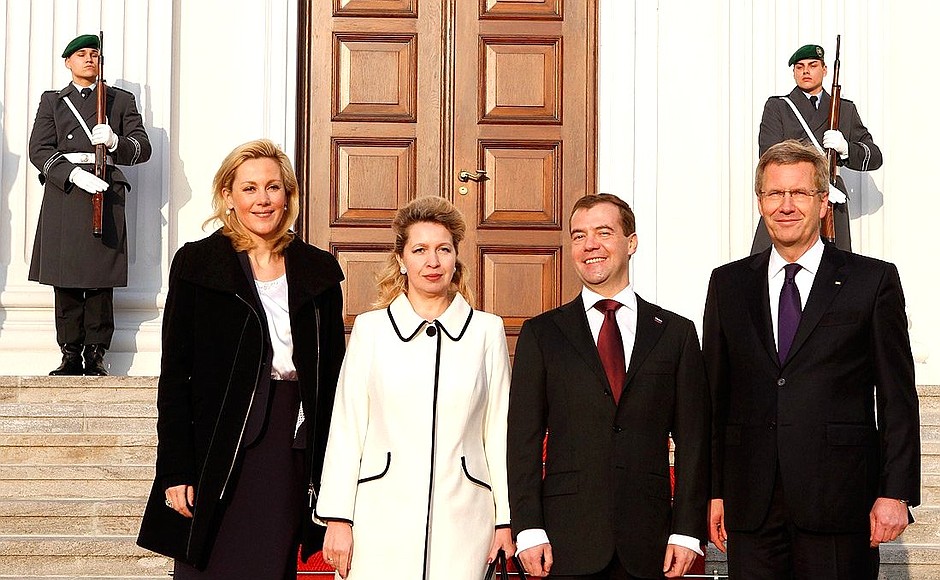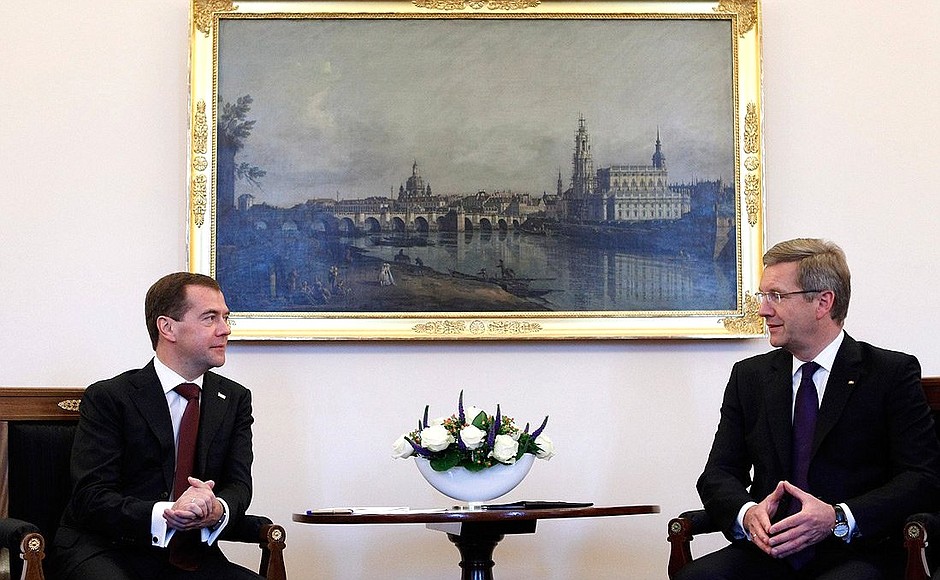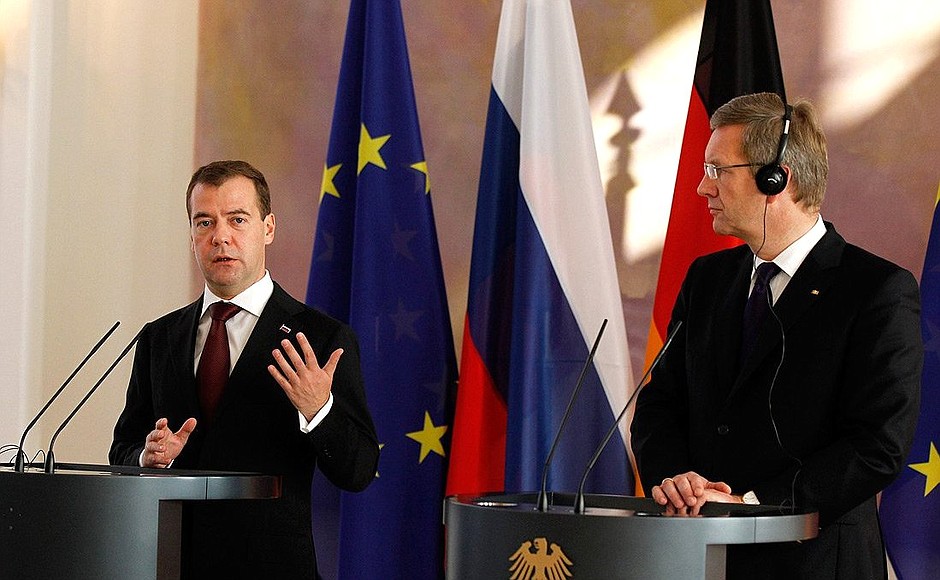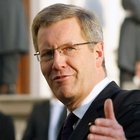The two leaders discussed financial, economic, foreign policy and humanitarian cooperation between the two states.
Following the talks, Dmitry Medvedev and Christian Wulff gave a joint news conference.
* * *
Excerpts from news conference following Russian-German talks
President of Russia Dmitry Medvedev: Ladies and gentlemen, colleagues,
I would like to thank President Wulff for the invitation to make an official visit to the Federal Republic of Germany.
Recently, Mr Wulff and I met in Russia, where we talked about the issues that were mentioned just now. I believe the agenda of this return visit is so rich in various events which fully reflect the level of interaction and rapport between our states and the strategic partnership that has evolved between us.
Our meeting began with a conversation with young people. Later Mr President and I exchanged impressions about it. Naturally, these young people cannot remember the difficulties that existed only 30 or 40 years ago. Perhaps they attribute less importance to history, but history should never be forgotten.
”The relations between Russia and Germany are an excellent example of how it is possible to pass through an extremely difficult phase and forge a relationship that is not just good-neighbourly but one that is a strategic partnerships and a true friendship.“
I am grateful to Mr President for mentioning just now the lessons we should draw from the past and how we should view the future. In this sense, the relations between Russia and Germany are an excellent example of how it is possible to pass through an extremely difficult phase and forge a relationship that is not just good-neighbourly but one that is a strategic partnerships and a true friendship, enabling us to work together in all areas, ranging from the economy to humanitarian ties.
This visit’s agenda incorporates a variety of aspects. It started with the meeting between Mr President and myself, to be followed shortly by the launch ceremony for the Nord Stream gas pipeline, which I will attend. This long-awaited event marks a new stage in strengthening the relations between Russia and the European Union, Russia and Germany and a number of other countries that participated in the pipeline’s construction. Ultimately, this event will promote security in Europe, including energy security, which we value so highly, especially at times of economic problems.
The face of Russian-German relations is defined by more than the economy. The humanitarian ties between our states go back centuries and are of enormous importance as well. This makes our exchange of views on these issues particularly valuable.
I would like to remind you that during Mr President’s visit to the Russian Federation, we agreed to hold the Year of Russia in Germany and the Year of Germany in Russia in 2012 and 2013. We hope that these key cultural events will include a variety of meetings and contacts between civil societies, events in the sphere of culture, art and science. I think this is a very important initiative. Today, we must ensure that these events are organised at the highest level. I hope that Mr President will continue to be involved in the preparations and will personally monitor the progress because they are a significant component of the Russian-German dialogue.
”The launch ceremony for the Nord Stream gas pipeline marks a new stage in strengthening the relations between Russia and the European Union. Ultimately, this event will promote security in Europe, including energy security.“
We are open to promoting dialogue between civil societies and NGOs, as well as interpersonal contacts, especially among young people. As I told Mr President, there is only one but a significant obstacle to this: it concerns visas. We very much hope that now that we have adopted the roadmap, Germany and other EU countries with which we are currently involved in talks on the issue will begin to focus on not just easing visa requirements but on completely abolishing visas. Only then can we create a united Europe and only then can we count on a full-fledged partnership.
Let me remind you that the European Union and Germany are Russia’s key economic partners but Russia also has a very serious place on the EU market and the German market, so this matter is crucial.
We talked about all the issues directly and openly, in a spirit of partnership and at the same time bearing in mind that the level of relations between Russia and Germany and the history of this relationship allows us not to limit our discussion to an exchange of niceties but that we can count on reaching an understanding on highly complex matters. We hope that such close relations will continue to bind our two countries and that the leaders will always be able to communicate in such a way. We expect that in this challenging period for the EU countries, the decisions required to finally overcome this series of difficult, problem-ridden events experienced by certain states will be taken, including by Germany, and we will develop full-fledged and very advanced economic relations with Germany and other EU states. Why do I say this? Because a great deal depends on Germany here, as I said to Mr President, and we certainly hope that in this situation, all the states will act responsibly.
Once again I would like to thank you for the invitation to visit Germany. This is a very positive event for me and for our delegation. Thank you for your hospitality and we will continue our conversation later.
* * *
Question: Mr Medvedev, this question is about your assessment of the situation in the Middle East. Both Russian and German foreign ministers expressed concern about Israel’s intentions to attack Iran. What is your position on this, as a representative of one of the major UN powers?
”We agreed to hold the Year of Russia in Germany and the Year of Germany in Russia in 2012 and 2013. We must ensure that these events are organised at the highest level.“
Dmitry Medvedev: First, about coinciding views. You know, if views coincide on every issue, the history of humanity will be over. Even families never have completely identical opinions, so we shouldn’t strive to reach this objective because it would be harmful. However, it is important that our views coincide on key points and in that case everything will be alright.
We have just touched on the issue of visas. Indeed, we believe that visas are a vestige of the past, and the EU should abandon them in order to build full-fledged relations with Russia. A variety of approaches is possible here but I would like to draw your attention to the fact that today the EU countries have a number of agreements with other countries that are developing according to very different scenarios. You can examine the list of those states and see whether they have ideal political lives, how far they have come in the fight against corruption, and what achievements in the field of democracy they have made.
As for the Middle East, we are certainly concerned about the situation that is emerging there, especially considering that even the reforms in North Africa have greatly affected sentiments in the Middle East. We cannot ignore the current problems in relations between Israel and Iran.
As a responsible member of the international community, a permanent Security Council member and a member of the negotiating process, Russia will continue to urge Iran to act responsibly, by which I mean to implement the adopted decisions and demonstrate that the Iranian nuclear programme is exclusively peaceful in its nature. During my contacts with the leadership of Iran, all of Iran's leaders, including the President, have repeatedly assured me that they are willing to provide the relevant evidence and are ready to interact with other participants in the negotiations. Unfortunately, there has been no progress in this area.
As for confrontational statements that someone, be it Israel or some other state, is preparing to use force against Iran or any other country in the Middle East, it is very dangerous rhetoric. We realise that tensions in the Middle East are running high. We know that the Middle East peace process is at an impasse; there has been no progress despite the serious efforts made by all the participants in the process. Raising a militarist tide and issuing threats in these circumstances could trigger very complex consequences, including a military conflict. That is why I believe it is important to keep calm and continue constructive talks on all aspects of the Middle East agenda, Iran's nuclear programme, as well as all other issues, and not make threats about the use of force in this situation. This could result in a major war, and for the Middle East it would be a catastrophe – just look at the map and see how many countries are concentrated there and what the consequences of the use of force in the region would be.
